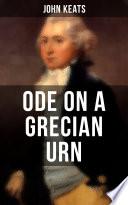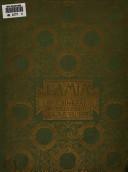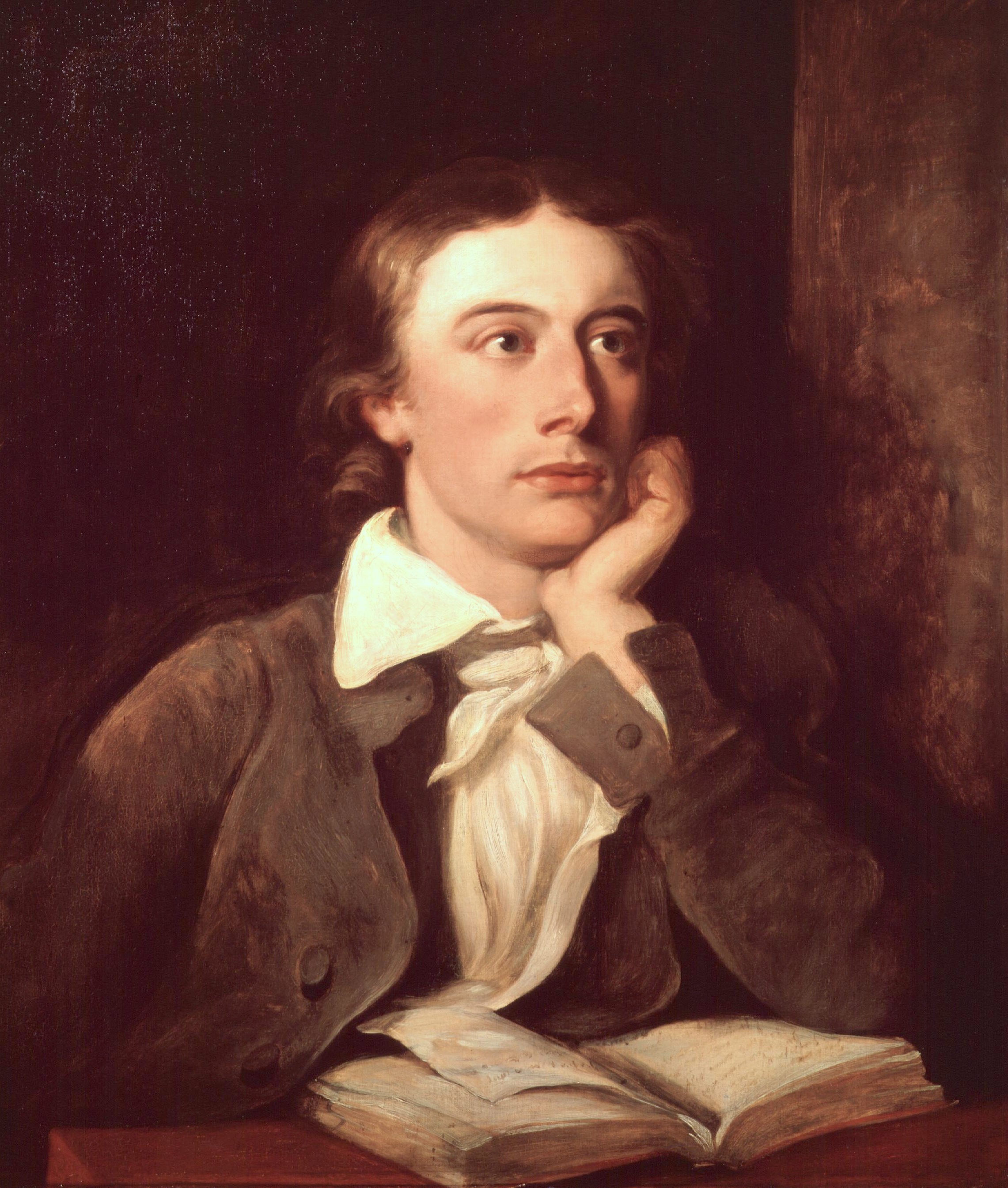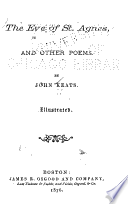Works

Ode on a Grecian Urn
John KeatsLa Belle Dame sans Merci
John KeatsTo Autumn
John KeatsOde on Melancholy
John KeatsSleep and Poetry
John KeatsLetter to Richard Woodhouse
John Keats
Lamia
John KeatsOde to Psyche
John KeatsLetter to George and Thomas Keats
John KeatsTo George Felton Mathew
John KeatsFamous John Keats Quotes
John Keats Quotes about love
then on the shore
Of the wide world I stand alone, and think
Till Love and Fame to nothingness do sink.
"When I have fears that I may cease to be" (1817)
Source: The Complete Poems
“My love is selfish. I cannot breathe without you.”
Source: Bright Star: Love Letters and Poems of John Keats to Fanny Brawne
“Darkling I listen; and, for many a time
I have been half in love with easeful Death”
Stanza 6
Poems (1820), Ode to a Nightingale
Source: The Complete Poems
Context: Darkling I listen; and, for many a time
I have been half in love with easeful Death,
Call'd him soft names in many a musèd rhyme,
To take into the air my quiet breath;
Now more than ever seems it rich to die,
To cease upon the midnight with no pain,
While thou art pouring forth thy soul abroad
In such an ecstasy!
Still wouldst thou sing, and I have ears in vain —
To thy high requiem become a sod.
John Keats Quotes about beauty
“I am sailing with thee through the dizzy sky!
How beautiful thou art!”
Source: Bright Star: Love Letters and Poems of John Keats to Fanny Brawne
Letter to Benjamin Bailey (November 22, 1817)
Letters (1817–1820)
To Fanny Brawne (c. February 1820)
Letters (1817–1820)
Context: "If I should die," said I to myself, "I have left no immortal work behind me — nothing to make my friends proud of my memory — but I have loved the principle of beauty in all things, and if I had had time I would have made myself remembered."
“A thing of beauty is a joy forever:
Its loveliness increases; it will never
Pass into nothingness”
Bk. I, l. 1
Endymion (1818)
Context: A thing of beauty is a joy forever:
Its loveliness increases; it will never
Pass into nothingness; but still will keep
A bower quiet for us, and a sleep
Full of sweet dreams, and health, and quiet breathing.
John Keats: Trending quotes
“Heard melodies are sweet, but those unheard, are sweeter”
Stanza 2
Poems (1820), Ode on a Grecian Urn
Variant: Heard melodies are sweet, but those unheard
Are sweeter; therefore, ye soft pipes, play on.
Source: Ode on a Grecian Urn and Other Poems
Context: Heard melodies are sweet, but those unheard
Are sweeter: therefore, ye soft pipes, play on;
Not to the sensual ear, but, more endear’d,
Pipe to the spirit ditties of no tone.
Context: Heard melodies are sweet, but those unheard
Are sweeter: therefore, ye soft pipes, play on;
Not to the sensual ear, but, more endear’d,
Pipe to the spirit ditties of no tone.
Fair youth, beneath the trees, thou canst not leave
Thy song, nor ever can those trees be bare;
Bold Lover, never, never canst thou kiss,
Though winning near the goal — yet, do not grieve;
She cannot fade, though thou hast not thy bliss,
For ever wilt thou love, and she be fair!
Source: Bright Star: Love Letters and Poems of John Keats to Fanny Brawne
“Beauty is truth, truth beauty,—that is all
Ye know on earth, and all ye need to know”
Source: The Complete Poems
John Keats Quotes
“The poetry of earth is never dead.”
" Sonnet. On the Grasshopper and the Cricket http://www.bartleby.com/126/28.html"
Poems (1817)
“Nothing ever becomes real till it is experienced”
Even a proverb is no proverb to you till your Life has illustrated it.
Letter to George and Georgiana Keats (February 14-May 3, 1819)
Letters (1817–1820)
Variant: Nothing ever becomes real till it is experienced
“Shakespeare led a life of allegory: his works are the comments on it.”
Letter to George and Georgiana Keats (February 14 - May 3, 1819)
Letters (1817–1820)
Context: A man's life of any worth is a continual allegory — and very few eyes can see the mystery of life — a life like the Scriptures, figurative... Lord Byron cuts a figure, but he is not figurative. Shakespeare led a life of allegory: his works are the comments on it.
“Shed no tear! O shed no tear!
The flower will bloom another year.”
"Faery Songs", I (1818)
Context: Shed no tear! O shed no tear!
The flower will bloom another year.
Weep no more! O weep no more!
Young buds sleep in the root's white core.
Letter to John Hamilton Reynolds (May 3, 1818)
Letters (1817–1820)
Context: Axioms in philosophy are not axioms until they are proved upon our pulses: we read fine things but never feel them to the full until we have gone the same steps as the author.
“I wish I was either in your arms full of faith, or that a Thunder bolt would strike me.”
Source: Bright Star: Love Letters and Poems of John Keats to Fanny Brawne
"Sleep and Poetry", st. 11
Poems (1817)
" Ode http://www.bartleby.com/126/44.html", The Fair Maid of the Inn
Poems (1820)
Source: Letters of John Keats
“My spirit is too weak — mortality
Weighs heavily on me like unwilling sleep”
"On Seeing the Elgin Marbles" (1817)
Context: My spirit is too weak — mortality
Weighs heavily on me like unwilling sleep,
And each imagin'd pinnacle and steep
Of godlike hardship tells me I must die
Like a sick Eagle looking at the sky.
Bk. I, l. 789
Endymion (1818)
Context: Ghosts of melodious prophesyings rave
Round every spot where trod Apollo's foot;
Bronze clarions awake, and faintly bruit,
Where long ago a giant battle was;
And, from the turf, a lullaby doth pass
In every place where infant Orpheus slept.
Feel we these things? — that moment have we stept
Into a sort of oneness, and our state
Is like a floating spirit's. But there are
Richer entanglements, enthralments far
More self-destroying, leading, by degrees,
To the chief intensity: the crown of these
Is made of love and friendship, and sits high
Upon the forehead of humanity.
“Ghosts of melodious prophesyings rave
Round every spot where trod Apollo's foot”
Bk. I, l. 789
Endymion (1818)
Context: Ghosts of melodious prophesyings rave
Round every spot where trod Apollo's foot;
Bronze clarions awake, and faintly bruit,
Where long ago a giant battle was;
And, from the turf, a lullaby doth pass
In every place where infant Orpheus slept.
Feel we these things? — that moment have we stept
Into a sort of oneness, and our state
Is like a floating spirit's. But there are
Richer entanglements, enthralments far
More self-destroying, leading, by degrees,
To the chief intensity: the crown of these
Is made of love and friendship, and sits high
Upon the forehead of humanity.
"To Autumn", st. 1
Poems (1820)
Context: Season of mists and mellow fruitfulness,
Close bosom-friend of the maturing sun;
Conspiring with him how to load and bless
With fruit the vines that round the thatch-eves run;
To bend with apples the moss’d cottage-trees,
And fill all fruit with ripeness to the core;
To swell the ground, and plump the hazel shells
With a sweet kernel; to set budding more,
And still more, later flowers for the bees,
Until they think warm days will never cease,
For Summer has o’er-brimm’d their clammy cells.
Letter to James Hessey (October 9, 1818)
Letters (1817–1820)
Context: I have written independently without Judgment. I may write independently, and with Judgment, hereafter. The Genius of Poetry must work out its own salvation in a man: It cannot be matured by law and precept, but by sensation and watchfulness in itself — That which is creative must create itself — In Endymion, I leaped headlong into the sea, and thereby have become better acquainted with the Soundings, the quicksands, and the rocks, than if I had stayed upon the green shore, and piped a, silly pipe, and took tea and comfortable advice. I was never afraid of failure; for I would sooner fail than not be among the greatest.
Stanza 7
Poems (1820), Ode to a Nightingale
Context: Thou wast not born for death, immortal Bird!
No hungry generations tread thee down;
The voice I hear this passing night was heard
In ancient days by emperor and clown:
Perhaps the self-same song that found a path
Through the sad heart of Ruth, when, sick for home,
She stood in tears amid the alien corn;
The same that oft-times hath
Charm’d magic casements, opening on the foam
Of perilous seas, in faery lands forlorn.
“A poet is the most unpoetical of anything in existence; because he has no identity”
he is continually informing — and filling some other body.
Letter to Richard Woodhouse (October 27, 1818)
Letters (1817–1820)
" On First Looking into Chapman's Homer http://www.bartleby.com/126/24.html"
Poems (1817)
Context: Much have I travell’d in the realms of gold,
And many goodly states and kingdoms seen;
Round many western islands have I been
Which bards in fealty to Apollo hold.
Oft of one wide expanse had I been told
That deep-brow'd Homer ruled as his demesne,
Yet did I never breathe its pure serene
Till I heard Chapman speak out loud and bold:
Then felt I like some watcher of the skies
When a new planet swims into his ken;
Or like stout Cortez when with eagle eyes
He stared at the Pacific, and all his men
Look'd at each other with a wild surmise,
Silent, upon a peak in Darien.
“O, for a draught of vintage! that hath been
Cool'd a long age in the deep-delved earth.”
Stanza 2
Poems (1820), Ode to a Nightingale
Context: O, for a draught of vintage! that hath been
Cool'd a long age in the deep-delved earth.
Tasting of Flora and the country green,
Dance, and Provencal song, and sunburnt mirth!
O for a beaker full of the warm South,
Full of the true, the blushful Hippocrene,
With beaded bubbles winking at the brim,
And purple-stained mouth.
“A man's life of any worth is a continual allegory — and very few eyes can see the mystery of life”
a life like the Scriptures, figurative... Lord Byron cuts a figure, but he is not figurative. Shakespeare led a life of allegory: his works are the comments on it.
Letter to George and Georgiana Keats (February 14 - May 3, 1819)
Letters (1817–1820)
Stanza 1
Poems (1820), Ode on a Grecian Urn
Context: Thou still unravish'd bride of quietness,
Thou foster-child of silence and slow time,
Sylvan historian, who canst thus express
A flowery tale more sweetly than our rhyme:
What leaf-fringed legend haunts about thy shape?
Of deities or mortals, or of both,
In Tempe or the dales of Arcady?
What men or gods are these? What maidens loth?
What mad pursuit? What struggle to escape?
What pipes and timbrels? What wild ecstasy?
“Who hath not seen thee oft amid thy store?”
"To Autumn", st. 2
Poems (1820)
Context: Who hath not seen thee oft amid thy store?
Sometimes whoever seeks abroad may find
Thee sitting careless on a granary floor,
Thy hair soft-lifted by the winnowing wind;
Or on a half-reap’d furrow sound asleep,
Drows’d with the fume of poppies, while thy hook
Spares the next swath and all its twined flowers.
“Stop and consider! life is but a day;
A fragile dew-drop on its perilous way
From a tree’s summit.”
" Sleep and Poetry http://www.bartleby.com/126/31.html", st. 5
Poems (1817)
Source: The Complete Poems
Letter to Fanny Brawne (March 1820)
Letters (1817–1820)
“I was never afraid of failure; for I would sooner fail than not be among the greatest.”
Letter to James Hessey (October 9, 1818)
Letters (1817–1820)
Context: I have written independently without Judgment. I may write independently, and with Judgment, hereafter. The Genius of Poetry must work out its own salvation in a man: It cannot be matured by law and precept, but by sensation and watchfulness in itself — That which is creative must create itself — In Endymion, I leaped headlong into the sea, and thereby have become better acquainted with the Soundings, the quicksands, and the rocks, than if I had stayed upon the green shore, and piped a, silly pipe, and took tea and comfortable advice. I was never afraid of failure; for I would sooner fail than not be among the greatest.
“The excellence of every Art is its intensity.”
Source: Complete Poems and Selected Letters
“If poetry comes not as naturally as the leaves to a tree it had better not come at all.”
Variant: It ought to come like the leaves to the trees, or it better not come at all.
“O for a life of Sensations rather than of Thoughts!”
Letter to Benjamin Bailey (November 22, 1817)
Letters (1817–1820)
Source: Letters of John Keats
“You cannot conceive how I ache to be with you: how I would die for one hour…”
Source: Bright Star: Love Letters and Poems of John Keats to Fanny Brawne
“Thou art a dreaming thing,
A fever of thyself.”
Source: Bright Star: Love Letters and Poems of John Keats to Fanny Brawne
“My chest of books divide amongst my friends.”
Keats' last poem which doubled as his last will and testament
Stanza 3
Poems (1820), Ode to a Nightingale

